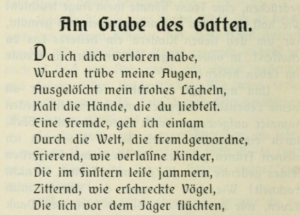| Source (German) | Translation (English) |
|---|---|
Am Grabe des Gatten. |
At the Grave of one’s husband. |
Da ich dich verloren habe, Wurden trübe meine Augen, Ausgelöscht mein frohes Lächeln, Kalt die Hände, die du liebtest. Eine Fremde, geh ich einsam Durch die Welt, die fremdgewordne, Frierend, wie verlassne Kinder, Die im Finstern leise jammern, Zitternd, wie erschreckte Vögel, Die sich vor dem Jäger flüchten, Scheu, wie heimatslose Bettler, Die an dunklen Mauern stehen. |
Since I lost you, Cloudy, my eyes became, Effaced, my joyful smile, Chilled, the hands you loved. A stranger, I walk lonely Through the strange world, Freezing, like abandoned children Moaning softly in the dark, Trembling like frightened birds, Fleeing from the hunter, Shy, like homeless beggars, Standing against dark walls. |
Da ich dich verloren habe, Da verlor ich meine Heimat, Meine vielgeliebte Heimat; Denn die Heimat, das warst du. Sorgsam hast du mich gehütet Vor zu rauhen Lebenswinden, Tröstend hast du mich umfangen, Wenn ein Schmerz mir nahen wollte, Wenn ich einschlief, war das letzte, Was ich sah, dein liebes Auge, Beim Erwachen traf als erster Morgengruß mich stets dein Blick. |
Since I lost you, I lost my home, My beloved home; For home — that was you. Carefully you protected me From the brutal winds of life, Sympathetically you embraced me, When pain insisted on drawing near, When I fell asleep the last thing That I saw were your kind eyes, When I awoke, the first thing Always greeting me was your morning gaze. |
Da ich dich verloren habe, Habe ich mich selbst verloren, Denn ich lebte nur in dir. Stolz wie eine Kön’gin war ich, Wenn du mir zur Seite gingest, — Reich wie eine Füritin schien ich, Wenn dein Mund mich liebend grüßte. — Bin verarmt und ausgestoßen, Nun du mich verlassen hast. Und in langen Nächten klag’ ich, Daß zu schwer mir meine Bürde. Aber du, — du hörst mich nicht. |
Since I lost you, I lost myself, For I lived only in you. Proud as a queen was I, When you stood by my side, — Rich as a princess I seemed, When your mouth greeted me lovingly. — I am impoverished and outcast, Now that you have left me. And in long nights I lament, That too heavy is my burden. But you, — you hear me not. |
Da ich dich verloren habe — Konnte ich dich denn verlieren, Lebst du nicht in meiner Seele, Bist du mir nicht immer nahe, Darf ich, Liebster, dich nicht lieben, Lieben, bis mein Herz mir bricht? Nein, ich hab’ dich nicht verloren, Nur in weiter Ferne weilst du Und mit müden Füßen muß ich Eine stein’ge Straße gehen, Eine rauhe, stein’ge Straße, Die zuletzt zu dir mich führt. |
Since I lost you — Could I possibly lose you?‽! Don’t you live in my soul? Aren’t you always near me? May I, dearest, not love you, Love till my heart breaks? No, I have not lost you, Only far away you dwell And with weary feet must I Walk a stony road, A rough, stony road, That leads me to you at last. |
“Am Grabe des Gatten” by Lisa Tarlau can be found in Rabbi Max Grunwald’s anthology of Jewish women’s prayer, Beruria: Gebet- und Andachtsbuch für jüdische Frauen und Mädchen (1907), pages 544-545.
The transcription of the German provided machine-readable text for machine translations by DeepL, which we then edited for accuracy and clarity. We welcome any/all corrections, improvements, and additional transcriptions and translations of this work’s contents. –Aharon Varady
Source(s)


“Am Grabe des Gatten | At the grave of one’s husband, a teḥinah by Lise Tarlau (1907)” is shared through the Open Siddur Project with a Creative Commons Attribution-ShareAlike 4.0 International copyleft license.










Leave a Reply